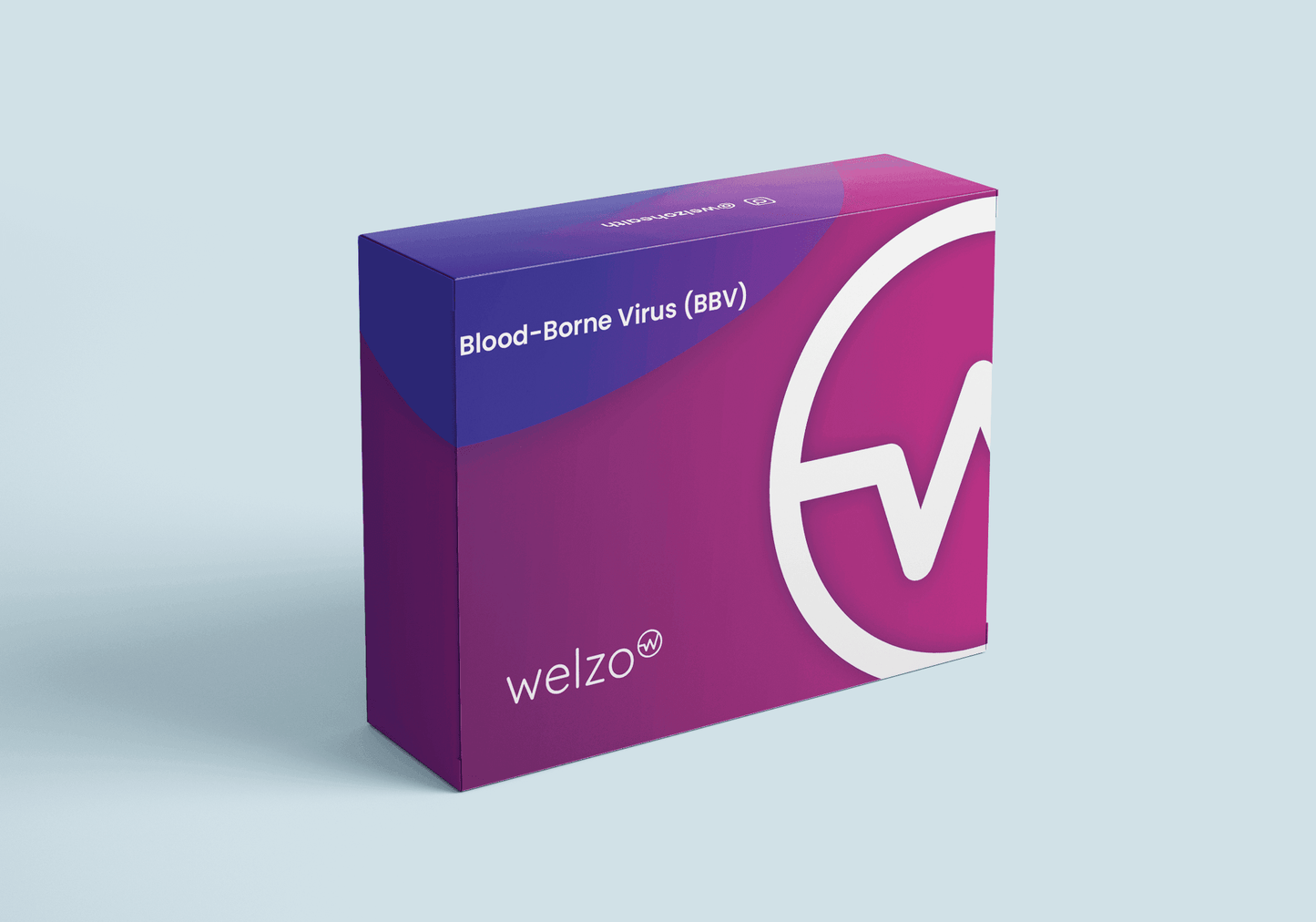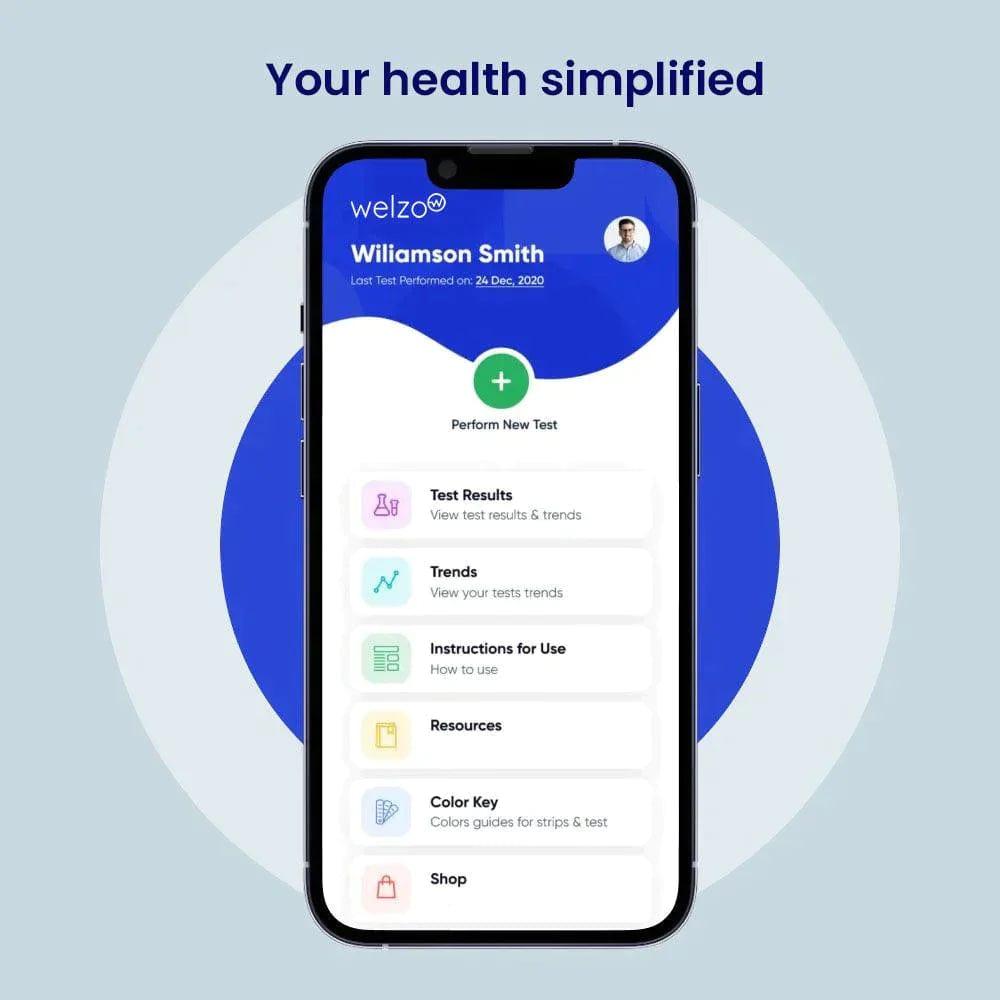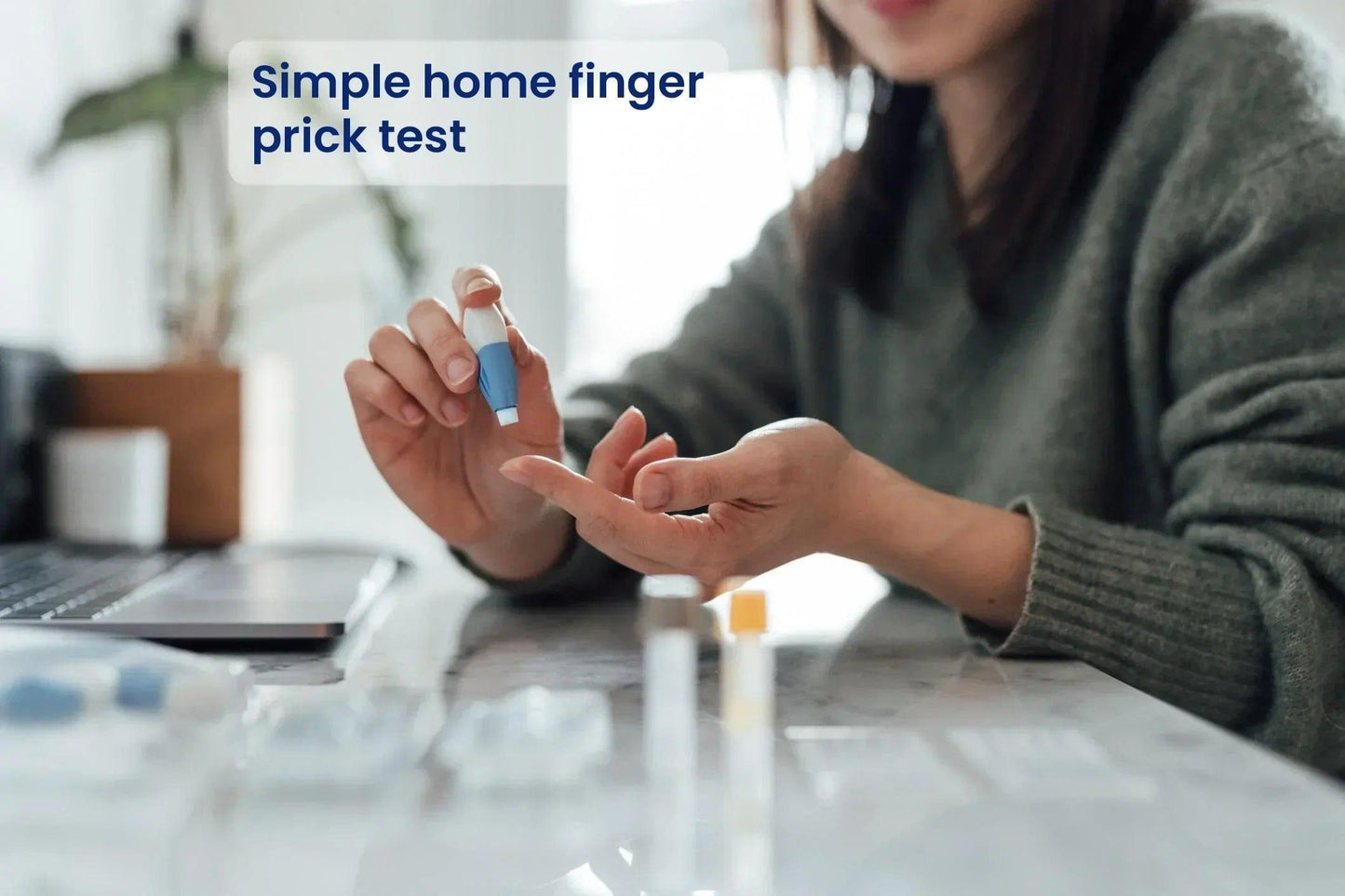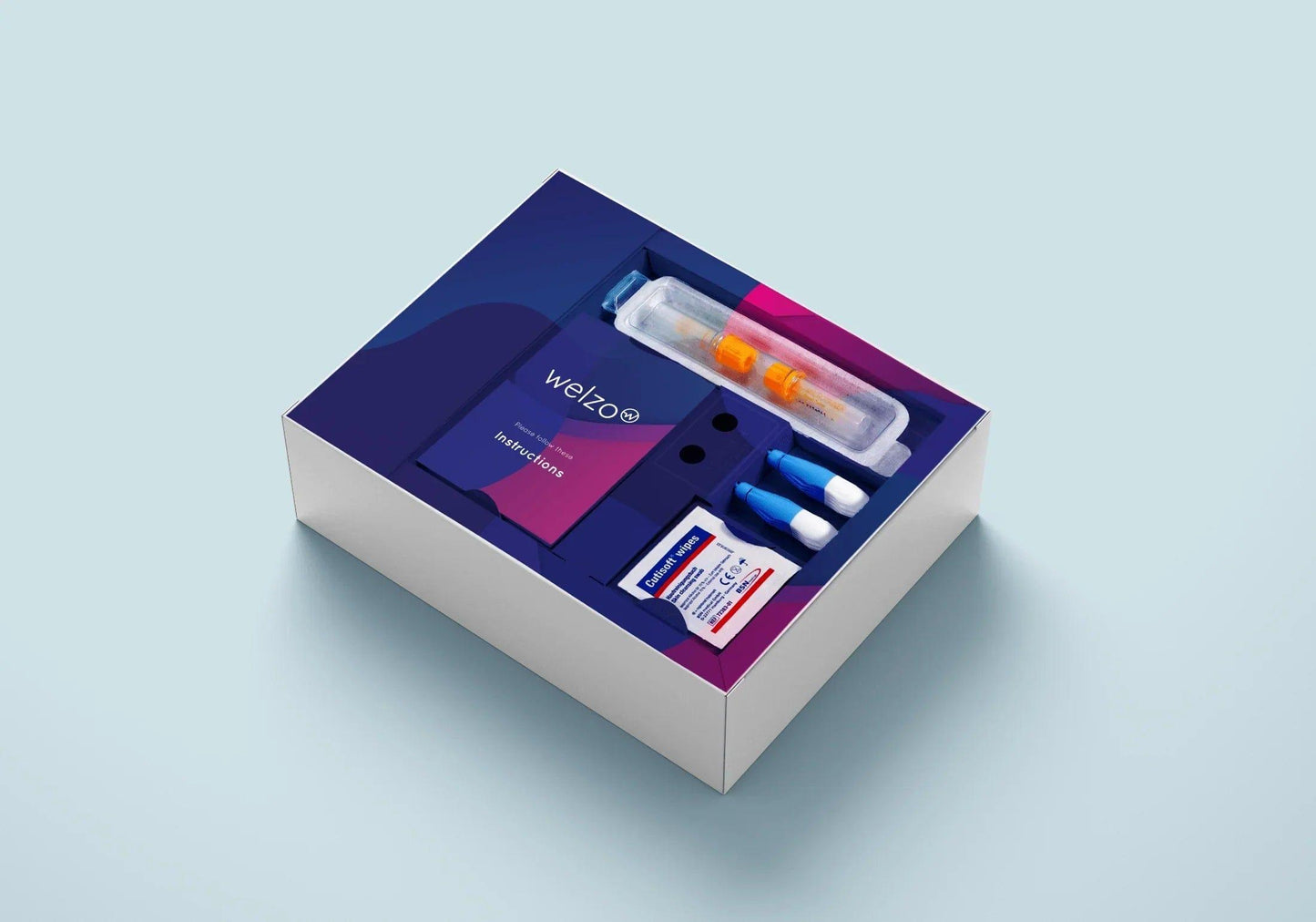BBV Testing
A home Blood-Borne Virus (BBV) test kit is a medical device that allows individuals to screen themselves for blood-borne viruses such as HIV, Hepatitis B, and Hepatitis C in the privacy of their own home. The design and procedure may vary slightly by brand, but the overall concept remains the same.
The Home BBV Test Kit is an easy-to-use, highly accurate self-testing device designed to detect the presence of common blood-borne viruses (HIV, Hepatitis B and Hepatitis C). This confidential, home-use kit offers convenience, peace of mind, and early detection without needing to visit a healthcare provider or lab.
- Hepatitis B Core Antibodies
- Hepatitis B surface antigen (HBsAg)
- Human Immunodeficiency Virus
- Hepatitis B surface antibodies (Anti-HBs)
- Hepatitis C
The UK's Highest Rated Home Testing Provider
- Biomarkers
- Information
Hepatitis B Core Antibodies
Hepatitis B core antibodies (Anti-HBc) are a type of antibody that the body produces in response to a part of the hepatitis B virus called the core antigen.
The presence of these antibodies can indicate a past or current hepatitis B virus (HBV) infection. They typically appear shortly after the onset of symptoms or infection, and usually remain in the bloodstream for life, even after the disease has resolved.
There are two types of Anti-HBc antibodies: IgM and IgG. IgM is the first antibody to appear after infection and it usually indicates a new or acute infection. IgG replaces IgM over time and typically signifies a past infection or a chronic (ongoing) infection.
The Anti-HBc antibodies are an important biomarker in diagnosing and understanding the timeline of a hepatitis B infection. However, they cannot differentiate between an active or previous infection on their own, and additional testing (e.g., testing for the presence of the Hepatitis B surface antigen, or HBsAg) is needed for a comprehensive picture of a person's hepatitis B status.
Hepatitis B surface antigen (HBsAg)
Hepatitis B surface antigen (HBsAg) is a protein on the surface of the Hepatitis B virus. It's present in the blood of someone who is infected.
When a person is infected with Hepatitis B, the HBsAg is the first marker that appears in the blood, even before symptoms start to appear. Therefore, a test that detects the presence of HBsAg is used to diagnose current Hepatitis B infections.
Typically, if the HBsAg remains positive for more than six months, it signifies a chronic (or long-term) Hepatitis B infection. If it becomes negative within six months, it means the person's immune system has successfully fought off the acute infection.
Importantly, the presence of HBsAg in the blood also signifies that the person is infectious and can pass on the virus to others. This is especially significant in the context of blood donation, needle sharing, sexual contact, and mother-to-child transmission.
While a positive HBsAg test indicates a current infection, additional testing is usually needed to determine whether the infection is acute or chronic, and to guide treatment decisions.
Remember that testing for HBsAg is crucial for early detection and management of Hepatitis B infections, helping to prevent the long-term consequences of chronic Hepatitis B, such as liver cirrhosis and liver cancer.
Human Immunodeficiency Virus
HIV, or Human Immunodeficiency Virus, is a virus that attacks cells that help the body fight infection, making a person more vulnerable to other infections and diseases. If left untreated, HIV can lead to the disease AIDS (Acquired Immunodeficiency Syndrome).
In the context of biomarker testing, the two most common biomarkers for HIV are:
HIV Antibodies: These are proteins produced by the immune system to fight HIV. The presence of HIV antibodies typically indicates that a person has been infected with HIV.
HIV Antigens: These are proteins produced by the HIV virus itself. The most commonly tested HIV antigen is p24, which can be detected in the blood within 2-4 weeks after HIV infection.
In most modern HIV tests, both antibodies and antigens are tested simultaneously in a combination (or "4th generation") test. This allows for earlier and more accurate detection of HIV than testing for antibodies alone. A positive result usually requires a follow-up test to confirm the diagnosis.
Here's a basic outline of how these tests work:
A sample of blood is collected.
The sample is examined for the presence of HIV antibodies and/or antigens.
If either HIV antibodies or antigens are detected, the test is considered positive, indicating that HIV infection may be present.
A positive result is usually confirmed with a follow-up test, such as an HIV RNA test, which can detect the genetic material of the virus.
It's important to note that it can take several weeks for the body to produce enough antibodies and antigens to be detectable by tests. This period, known as the "window period," varies from person to person but is typically around three weeks.
Hepatitis B surface antibodies (Anti-HBs)
Hepatitis B surface antibodies (Anti-HBs) are antibodies produced by the immune system in response to the surface antigen of the Hepatitis B virus (HBsAg). They are a key biomarker in determining an individual's immune status to Hepatitis B.
When detected in a home blood test, these antibodies usually indicate one of the following:
Recovery and Immunity: If Anti-HBs are present and the individual tests negative for Hepatitis B surface antigen (HBsAg), it usually indicates that the person has recovered from a past Hepatitis B infection and is now immune. The immune system, having successfully fought off the infection, now retains a "memory" in the form of these antibodies, which should protect the individual from future infections.
Vaccination: Anti-HBs also develop in response to the Hepatitis B vaccine. This is the goal of vaccination: to stimulate the immune system to produce these protective antibodies without causing an actual infection. A positive Anti-HBs test in the absence of other Hepatitis B markers typically indicates immunity due to successful vaccination.
It's important to note that while presence of Anti-HBs typically suggests immunity, their absence doesn't necessarily mean a person is susceptible to Hepatitis B. For instance, some people who have recovered from Hepatitis B may have Anti-HBs levels too low to detect, yet they are still immune. As a rule, further testing is advised in cases of uncertainty.
Hepatitis C
Hepatitis C is a blood-borne virus that primarily affects the liver. In a home blood test for Hepatitis C, the key biomarker that is often looked for is the Hepatitis C antibody (Anti-HCV).
Anti-HCV are antibodies produced by the immune system in response to the Hepatitis C virus. When the body encounters the Hepatitis C virus, it produces these antibodies to fight off the infection. Therefore, the presence of Anti-HCV in a person's blood typically indicates that they have been exposed to the Hepatitis C virus at some point.
However, it's important to note a couple of things about this biomarker:
It does not distinguish between past and present infection: If a person has been infected with Hepatitis C in the past but their body has cleared the virus, they will still have Anti-HCV in their blood. Similarly, if a person has an ongoing or chronic Hepatitis C infection, they will also have Anti-HCV. This means that, on its own, a positive result for the Anti-HCV biomarker doesn't tell you whether the person is currently infected.
It does not indicate immunity: Unlike some other viruses, if you've had Hepatitis C and cleared it or been successfully treated, this does not make you immune to future Hepatitis C infections. A positive Anti-HCV result therefore does not indicate immunity.
Because of these factors, a positive result for the Anti-HCV biomarker in a home blood test should be followed up with further testing in a healthcare setting. This can include an RNA test, which can confirm whether the virus is currently present in the person's blood.
Who is at risk of Blood-Borne Viruses (BBVs)?
Blood-Borne Viruses (BBVs) such as Hepatitis B, Hepatitis C, and HIV can affect anyone, but certain groups of people are at a higher risk due to their exposure to risk factors. Here are some groups of people who are typically at a higher risk of getting infected by a BBV:
People who inject drugs: Sharing needles, syringes, or other drug paraphernalia can transmit BBVs.
Healthcare workers: Accidental needlestick injuries or contact with patient bodily fluids can put healthcare workers at risk.
People with multiple sexual partners or who have unprotected sex: BBVs can be transmitted through sexual contact, particularly if protection is not used.
People who have received blood transfusions or organ transplants: This is especially true if the procedures occurred before blood screening became rigorous.
People with tattoos or body piercings: If the equipment used is not sterile, BBVs can be transmitted.
People who travel or work in areas with high prevalence of BBVs: Certain regions have higher prevalence rates of these viruses, and living or working in these areas can put a person at risk.
Individuals born to mothers with a BBV: Vertical transmission from mother to child can occur during childbirth.
Men who have sex with men (MSM): This group has a higher risk of HIV and Hepatitis B and C transmission.
People in correctional facilities: Overcrowded living conditions and risky behaviors like sharing needles and unsafe sex increase the risk.
People on hemodialysis: The process of hemodialysis, where blood is circulated outside the body, can carry a risk of BBV transmission if strict infection control practices are not adhered to.
Preventative measures like vaccination (for Hepatitis B), safe sex practices, using sterile needles (for both drug use and medical procedures), regular screening, and early treatment can greatly reduce the risk of acquiring or transmitting these viruses.







Get BBV Testing Online
"Blood-borne viruses, or BBVs, such as HIV, Hepatitis B, and Hepatitis C, present a significant global health challenge. These infections can lead to severe health complications, including liver disease and cancer, and they can have a profound impact on a person's quality of life. Moreover, due to their mode of transmission, they often affect some of the most vulnerable populations, who may lack access to preventative measures and healthcare services.
One of the biggest challenges we face in tackling BBVs is the issue of 'silent transmission.' Many people with these viruses do not know they are infected because they may not show symptoms for years. During this time, they can unknowingly transmit the virus to others. This makes regular testing, particularly among high-risk populations, a crucial part of any effective public health strategy."

How to take a BBV Testing Test
Collecting a blood sample for your finger prick home test is straightforward. Watch the video below for more details on how to take a home blood test.
How Welzo Home Tests Work
-

Pick your home test
We have a wide range of tests to cover your health needs. Order with next day United Kingdom delivery and avoid sitting in a doctor's office or clinic. Use our quiz to find the right test for you.
-

Take your test
Activate your test and collect your sample in the morning. Return your sample on the same day, using the prepaid shipping label provided. Samples use a simple finger prick collection method that takes around 5 minutes to complete.
-

Results within 48 hours
You'll get verified results and insights into what the biomarkers mean. Order now to become a healthier you!
BBV Testing Information
Specification of BBV Testing
- Test name: BBV Testing
- Also known as & related tests:
- Biomarkers:
- Test tube:
- Brand: Welzo
- Turn around time: Approx. 24 hours
- Lab test ranges:
- Test Kit Marking: MHRA/UKCA
- Location of Lab: United Kingdom
What is a BBV Testing?
A BBV Testing is a home health test offered by Welzo. The BBV Testing can be taken from the comfort of your home using a finger prick sample, which is then sent back to our lab for analysis and interpretation.
What does a BBV Testing for?
A BBV Testing tests for the following: .
What are the benefits of a BBV Testing?
Checking your health through the use of BBV Testing is an important way to track your health. Home testing offers the convenience of conducting health assessments in the comfort of your own home, while enabling quicker, more private results without the need for visiting a healthcare facility.
Can a GP review my BBV Testing?
Yes, Welzo offers a GP review service for the BBV Testing. Follow the link if you would like to have an online GP appointment with your BBV Testing.
Are BBV Testings available on the NHS?
The NHS offers BBV Testings subject to eligibility requirements, consultations and local guidelines.
BBV Testing Kit and Ordering
How can a BBV Testing be ordered?
A BBV Testing can be ordered online through Welzo's secure checkout. Select the BBV Testing and add the patient's name and details, then checkout for next-day delivery.
What is included in the BBV Testing test kit?
The BBV Testing contains the following items in the test kit:
- 1 x UN3373 Test Kit for Biological Substances Category B (test kit design may vary from images displayed online depending on the test selected.
- 1 x Free Return Label
- 1 x Finger Prick Lancet / Urine Sample Pouch or Swab (depending on the test ordered)
- 1 x Cleansing Wipe/ Alcohol Swab
BBV Testing Biomarkers and Results
What biomarkers are tested for in a BBV Testing?
The BBV Testing checks for the following biomarkers:
What are the results ranges for a BBV Testing?
BBV Testing reference ranges vary based on age, sex, population sample and numeric test result ranges. However, once you complete your tests, you will receive clear reference ranges for your BBV Testing.
What is a normal test range for BBV Testing?
The BBV Testing range will be provided on the advanced Welzo reporting panel which will factor in multiple aspects such as age, population size comparison and biological sex.
BBV Testing Procedure and Timing
When should a BBV Testing be taken?
It is best to take a BBV Testing first thing in the morning.
How long does a BBV Testing take?
The typical turnaround for a BBV Testing is 24 hours from receipt at the Welzo laboratory, Monday to Thursday. However, results may come back faster or slower depending on how busy the Welzo laboratory is and if you have requested any biomarkers that take longer to test for. In this case, results can take up to 5 days.
Are there any special preparations required before taking the BBV Testing (e.g., fasting)?
We will let you know via email if there are any special requirements for the BBV Testing. However, typically we recommend you take a BBV Testing first thing in the morning, fasted.
What is the best time to post my BBV Testing?
The best time to return your BBV Testing sample is Monday to Thursday, before 14:00 to ensure the product arrives at our lab on time for same-day analysis.
What sample is required for a BBV Testing?
The BBV Testing requires a capillary blood sample using a that is collected from a finger-prick blood sample.
Welzo's Award Winning UK Home Blood Tests
Welzo health tests are shipped straight to your address the very next day.
We are a team of UK based doctors and scientists, making cutting edge analysis accessible.
We issue results 24/7, giving you personal insights into your body with support from our UK based admin and lab team.



















